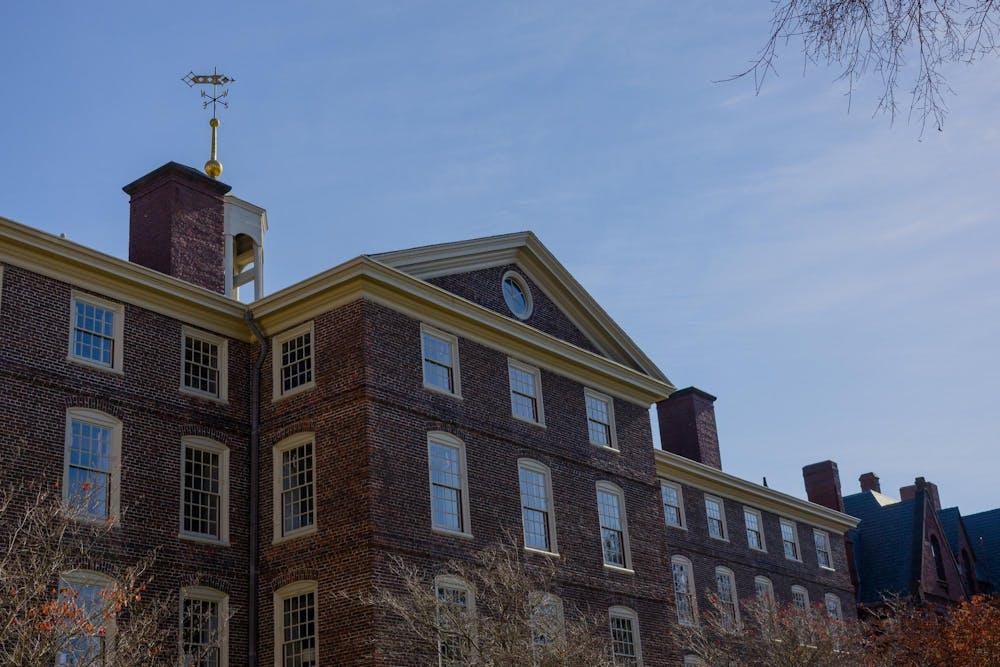President Christina Paxson P’19 P’MD’20 expressed concern about the influence of President Trump’s second term on higher education at Tuesday’s faculty meeting, including threats against Brown’s academic mission and an increased endowment tax.
Paxson emphasized that public confidence in elite higher education has been in decline since well before the election. She argued that the distrust stems from a number of factors, including the cost of university tuition, debates about the value of the liberal arts and public condemnation of “wokeness.”
“These are things that we face all the time, but when we’re in a transition like we are right now, I think some of these are going to come to the fore, especially with concerns about the federal budget next year,” she said.
Provost Frank Doyle, she added, has convened a small working group charged with keeping track of issues emerging out of Trump’s second presidency, “with an eye to how they would affect on-campus constituents.”
Paxson then moved to discuss the recent increased politicization and Congressional scrutiny of higher education.
“One thing I’ve prioritized this year is defending Brown from ongoing public and Congressional threats to higher education,” she said. “This has been a concern for some time.”
In the past year, the House Committee on Education and the Workforce has held multiple Congressional hearings for university presidents, which have preceded the resignations of three Ivy League presidents at Harvard, Penn and Columbia.
Paxson assured faculty that the University has been “working very collaboratively” with peer institutions and other members of the Association of American Universities to address various institutional priorities.
“We are in Washington a lot,” Paxson said, “talking to legislators and their staff, helping them understand our priorities and understanding their concerns so we can have good conversations.”
She also expressed worry about how an early Trump administration executive order may threaten Brown’s academic mission, including the University’s diversity, equity and inclusion initiatives.
Paxson also echoed concern for international students with visas after a Monday email from the University advised international students, faculty, staff members and scholars to return to Providence before Trump’s inauguration on Jan. 20. Trump has previously vowed to reinstate his 2017 travel ban, which primarily targeted Muslim countries.
“Our spring semester starts right before inauguration, so dorms are open and if students feel like they need to stay here over break, we will support them,” Paxson said.
Other universities, including Yale and the Massachusetts Institute of Technology, have issued similar advisories, but no travel bans have officially been announced.
She added that undocumented students, especially those with Deferred Action for Childhood Arrivals status, may be under threat. The DACA program delays the deportation of undocumented immigrants who came to the United States as children and allows them to apply for work authorization. Trump rescinded DACA in 2017, but the Supreme Court overturned Trump’s decision in 2020. Following a district court opinion in 2021, no new DACA requests were allowed.
Paxson released a statement following the 2016 presidential election in which she vowed to support undocumented students and detailed Brown’s legal and financial resources for students. In August 2017, Paxson sent a letter to Trump urging him to preserve DACA and establish a path towards permanent citizenship for those with DACA status.
Trump has also said he would increase taxes on large universities in his second term. In 2017, he signed into law a 1.4% tax on endowment investment income for many universities with a per-student endowment exceeding $500,000. At the time, Brown didn’t qualify for the tax, but the endowment is now large enough that it meets the tax threshold, Paxson said.
Additionally, Vice President-elect J.D. Vance introduced a Senate bill to further raise the tax in 2023, which did not pass.
Paxson also expressed worry about research funding in addition to Medicare and Medicaid.
“We are working really, really closely with experts in the field and our partners across the spectrum of higher education … to address these issues with the relevant policy makers and educate them and lobby and argue that what we do is important and that we’re here to serve society,” she said.

Cate Latimer is a university news editor covering faculty, University Hall and higher education. She is from Portland, OR, and studies English and Urban Studies. In her free time, you can find her playing ultimate frisbee or rewatching episodes of Parks and Rec.





